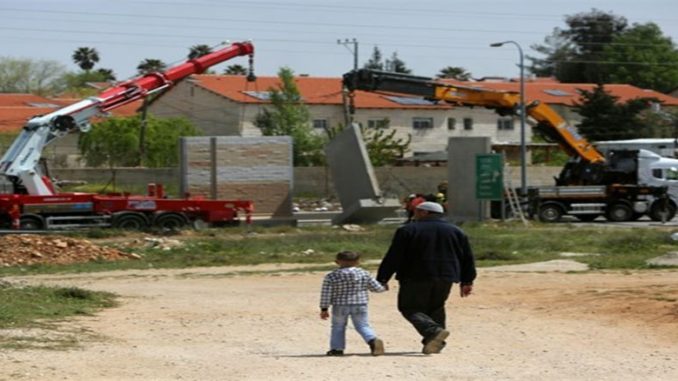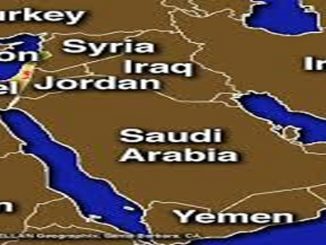
Israeli NGO and settlement watchdog Peace Now has accused Israel of attempting to “fool the international community,” saying the policy shows no restraint whatsoever.
This comes after an Israeli security cabinet decided to approve the first new illegal Israeli settlement in the occupied West Bank.
The cabinet’s policy reportedly came in response to pressure from US President Donald Trump’s administration to curb illegal settlement construction in the occupied Palestinian territory. However, according to Peace Now, the new policy “would enable continuous expansion of all settlements, without any limitations,” the group said in a statement Friday.
The group referenced Barak Ravid from the Israeli newspaper Haaretz, who said that the new policy is aimed at limiting settlement construction by containing construction to only “built up areas” of a settlement. However, if this is not possible, the construction would be limited to “an area adjacent to the built-up area.”
If this is still not feasible, then construction would be carried out “in an area that is close as possible to the “built-up area.” In addition, the policy reportedly also aims to prohibit the establishment of settler outposts, considered illegal by both the Israeli government and international law.
However, Peace Now pointed out that Israel’s policy interpretation of a settlement’s “built up area” expands much further than the actually constructed segments of a settlement’s area, and includes all of the land fenced off around the settlement and within the municipal boundaries of the settlement, which spread significantly further than the settlement itself.
“It is this argument over lines — with settlers looking to exploit any loophole they can find in order to permit more expansion of settlements — that has led past US administrations into the trap of seemingly endless and irresolvable negotiations over how to decide what it means to build ‘inside’ settlements,” the group said in their statement.
“Many settlements have far-flung ‘neighborhoods’ that, if used as the basis for the ‘construction line,’ would permit massive expansion that would allow settlements to grow many times over.”
The group illustrated the policy by using maps of the illegal Israeli settlements of Eli and Maale Adumim that show tracts of “empty land” between actual constructed areas of the settlement, the fence surrounding that land, and even more land comprising the settlement’s municipal borders beyond the fence.
Credit: Peace Now
Credit: Peace Now
“Under the pretense of restraint, the Israeli government has drafted a policy that will allow it to continue and expand settlements without any limitations,” the group stated.
Peace Now added that the Israeli government was attempting to “fool the international community” by developing a policy of restraint around Israeli settlement construction in name only, while actually contributing to the unfettered expansion of illegal settlements that has been consistently condemned and deemed illegal by the international community.
Israeli rights group B’Tselem also slammed the new settlement policy in a statement on Friday, saying that the policy was “unbridled theft masquerading as ‘restrained construction.’”
The Israeli policy represents “continued oppression of Palestinians, settlement expansion, and breach of international law. Going over the heads of Palestinians, Israel facilitates the continued theft of more and more of their land while forbidding them from building on it, demolishing their homes, and flagrantly disregarding their needs,” the statement read.
B’Tselem added that the new policy would add to the fragmentation of the occupied Palestinian territory, and will allow the Israeli state to “go on building as it pleases, whether in or outside of settlement boundaries, in complete disregard of UNSCR 2334 on the illegality of the entire settlement enterprise.”
According to Haaretz, the new settlement Emek Shilo, built on a hilltop Peace Now referred to as Geulat Zion, will be located near the already established illegal settlement of Shilo in the occupied West Bank district of Ramallah. The last time the Israeli government approved a new settlement inside the occupied West Bank was in 1991.
According to Peace Now, the location of the new settlement strategically fragments the West Bank, as it “continues a stretch of settlements from the Green Line to the Jordan Valley, aiming to undermine the possibility of creating a viable Palestinian state.”
Peace Now also pointed out that the settlement was the first to be established since the Oslo Peace Accords, which the international community had hoped would set the groundwork for an independent Palestinian state, but has since been rejected by many Palestinians due to Israel’s continued settlement expansions, military violence, and security coordination between the Palestinian Authority and Israel.
Citing a statement released by the Israeli prime minister’s office, Haaretz said that the decision to establish the settlement was part of a “promise” Netanyahu gave to Israeli settlers of the illegal Amona outpost, as residents were facing court-sanctioned demolitions several months ago after building on private Palestinian land.
Peace Now said that during the cabinet meeting, Netanyahu also announced his final approval to market land on which 1,992 new settler units –including 698 in Alfei Menashe, 612 in Beit Illit, and 630 in Beit Arie — would be constructed.
In addition, Netanyahu announced that 977 dunums (241 acres) of Palestinian land were set to be declared “state land,” in order to retroactively legalize three Israeli settler outposts, Palgei Maim and Givat Haroeh — both located near the already established Eli settlement, as well as Adei Ad, located east of the newly declared settlement Emek Shilo and near the Jordan Valley.
The announcements were strongly condemned by Palestinian leaders on Thursday and Friday, with PLO Executive Committee member Hanan Ashrawi saying that the announcement “once again proves that Israel is more committed to appeasing its illegal settler population than to abiding by the requirements for stability and a just peace.”
Meanwhile, the UN released a statement noting that Secretary General Antonio Guterres “took notice with disappointment and alarm” following the decision.
“The Secretary-General has consistently stressed that there is no Plan B for Israelis and Palestinians to live together in peace and security. He condemns all unilateral actions that, like the present one, threaten peace and undermine the two-state solution,” the statement read, while reiterating the UN’s stance on the illegality of Israeli settlements on Palestinian territory.
As of Saturday, Egypt, Italy, and France had also joined in denouncing Israel’s plans for the new settlement and for the expropriation of the Palestinian lands.
The Egyptian Foreign Ministry said that rapid settlement expansion “diminishes the chances of a two-state solution, while thwarting efforts to revive the peace process and resume negotiations between the Palestinians and Israel.”
The Israeli decision, according to the Egyptian foreign ministry, “imposes facts on the ground and undermines the Palestinians’ right to establish an independent state based on the pre-1967 borders whose capital is East Jerusalem.”
The Italian Ministry of Foreign Affairs also expressed “serious concern” over the Israeli violations of international law, saying in a written statement that the decisions “stave off the resumption of negotiations between the parties and the prospect of two States for two Peoples.”
A similar statement released by France’s Ministry of Foreign Affairs strongly condemned the decisions as an “extremely troubling development,” which “threaten peace and are liable to aggravate tensions on the ground.”
The Israeli government in recent months has dramatically expanded their settlement plans in the Palestinian territory.
Israel’s parliament, the Knesset, passed the outpost “Regularization law” in February, which could grant official Israeli governmental recognition to more than a dozen settlement outposts in the West Bank established on private Palestinian lands, considered illegal by both Israeli domestic law and international law. Rights groups have underscored that the law provides a green light for Israeli settlers to escalate the establishment of outposts on Palestinian land.
The law states that any settlements built in the West Bank “in good faith” — without knowledge that the land upon which it was built was privately owned by Palestinians — could be officially recognized by Israel pending minimal proof of governmental support in its establishment and some form of compensation to the Palestinian landowners.
Right-wing Israeli Knesset members have also spearheaded a bill to annex the massive Maale Adumim settlement. Maale Adumim is the third largest settlement in population size, encompassing a large swath of land deep inside the occupied West Bank’s Jerusalem district. Many Israelis consider it an Israeli suburban city of Jerusalem, despite it being located on occupied Palestinian territory in contravention of international law.



